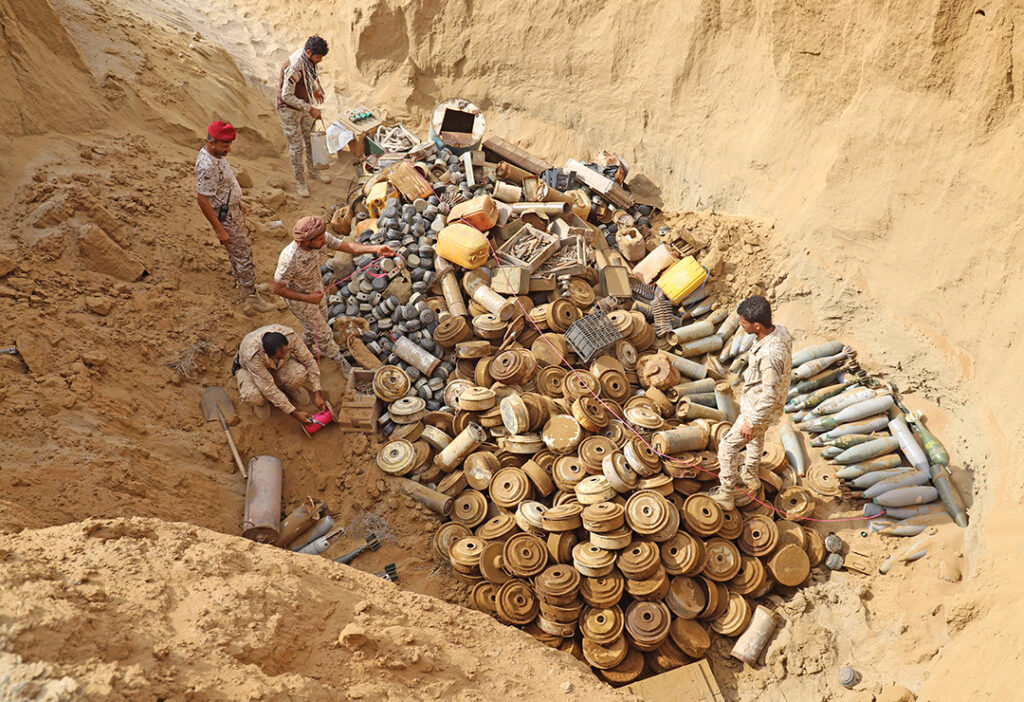MOAMMAR AL-ERYANI, YEMINI MINISTER OF INFORMATION, CULTURE AND TOURISM
It is no exaggeration to say that the planting of land mines by the Iranian-backed Houthi militia in Yemen since the coup in 2014 is the largest since World War II and is considered one of the most serious crimes against humanity committed by the militia against Yemenis’ present and future.
The Houthi militia has placed mines in all the areas it reached, withdrew from and still controls. It does so without differentiating between military and civilian sites. Houthi mines lurk among homes, schools, mosques, markets, and grazing and agricultural areas. They threaten lives along roads, at airports and ports, and in territorial waters and international shipping lanes.
The National Mine Action Program counts more than 7,000 civilian casualties — the majority women and children — from Houthi mines. These mines have left thousands of amputees and others with permanent disabilities. They also have obliterated livestock — cows, sheep and camels — in grazing grounds in Hodeidah, Marib, Al-Jouf, Al Dali and Shabwa governorates.
Tragic stories of civilian victims proliferate, including that of Nasser Muhammad, 13, who stepped on a Houthi mine while playing and lost an eye to shrapnel.
The Immorality of Mines
Yet even statistics from international organizations tasked with monitoring mines don’t reflect the scale of the disaster and the actual numbers of victims of Houthis mines. Governmental reports issued by the National Mine Action Program confirmed that the Houthi mines were not part of the Yemeni Army’s arsenal before the 2014 coup and that they were manufactured locally by the Houthis under supervision of the Iranian Revolutionary Guard and its allies.
National Mine Action Program Director Brig. Gen. Amin Saleh Al-Aqili stated that the Houthi militia uses ammonium nitrate (a major component in explosives used for mining) and TNT inside the mines’ metal shell.
Yemen signed the Ottawa mine-ban treaty in 1997 and passed legislation that criminalized and prohibited the manufacture, design, import, export, possession, transfer and planting of these mines. The Yemeni Army destroyed its stockpile in 2007. But the Houthis’ manufacture and planting of hundreds of thousands of mines spoiled that progress, and Yemen has regressed to being among the main countries in the world afflicted by mines.
Even worse, the Houthis, under supervision of Iranian-backed experts, transformed anti-vehicle mines into anti-personnel mines by attaching pressure plates triggered by weights as light as 3 kilograms, less than that of a toddler.
Houthis have crafted improvised explosive devices (IEDs) from rockets, tank shells and artillery, camouflaging them as rocks, and have fashioned stick bombs out of PVC pipe containing up to 30 kilograms of explosives.
The Houthis use heat sensors to activate camouflaged IEDs and mines on public roads without distinguishing between military and civilian targets, men or women, the elderly or children, humans or animals. A victim’s body heat activates the device when approaching the bomb, triggering an explosion.
Stepping on pressure wires can activate mines, and they also can be set off by remote control.
To kill demining teams and inflict the largest number of civilian casualties, the Houthis modified larger mines to ignite during attempts to remove them.
Iranian-backed Houthi terrorism is not limited to land: Their mines have appeared in the waters of the Red Sea and the Bab el-Mandeb strait to target commercial ships and oil tankers in international shipping lanes.
During the past few years, mines have damaged merchant ships and fishing boats, and hundreds of fishermen have been killed in coastal waters.
The joint forces of the Saudi-led Coalition to Support Legitimacy in Yemen announced that it has destroyed more than 150 mines to preserve maritime navigation.
Cleaning Up the Fields of Death
Yemen’s legitimate government has made great strides in removing and destroying mines, raising awareness of their dangers and assisting victims. This has occurred through the National Mine Action Program and the military engineering teams of the Ministry of Defense, in partnership with the United Nations Development Program, the Saudi Project for Landmine Clearance (MASAM), and supporting states and organizations.
Despite political and economic turmoil caused by years of wars in Yemen, medical teams have aided victims by performing plastic surgery, fashioning artificial limbs and providing rehabilitation.
Within the framework of the rapid response plan approved by the government, the National Mine Action Program, with the support of brothers and friends, has conducted mine clearance across vast areas of Yemen. As of August 2020, we have destroyed 14,031 anti-personnel mines and 621,531 anti-vehicle mines. A UNICEF-supported mine-awareness campaign reached nearly 1.3 million Yemenis.
This work continues the demining efforts of the United Nations Development Program, which disposed of more than 35,000 mines and unexploded ordnance in 2019.
The MASAM project, affiliated with the King Salman Humanitarian Aid and Relief Center, played a major role in bringing hope to Yemenis. Its demining teams enabled the displaced to return to their homes and provided medical care and humanitarian aid to mine victims.
The Houthis’ excessive use of mines and IEDs — and planting them randomly without maps in populated regions — constitutes a danger to millions of civilians. It disrupts public life, exacerbates human suffering, hinders development, and represents an environmental risk for decades to come, long after the war ends.
Although the Houthi mines remain a core issue in peace talks, United Nations Special Envoy Martin Griffiths has expressed disappointment at lack of progress on the part of the Houthis and their Iranian supporters.
Will the international community and the United Nations Security Council turn their backs on these crimes in which thousands of women, children and the elderly fall victim to mines? Will the world hold Houthi leaders accountable for these war crimes and crimes against humanity?

